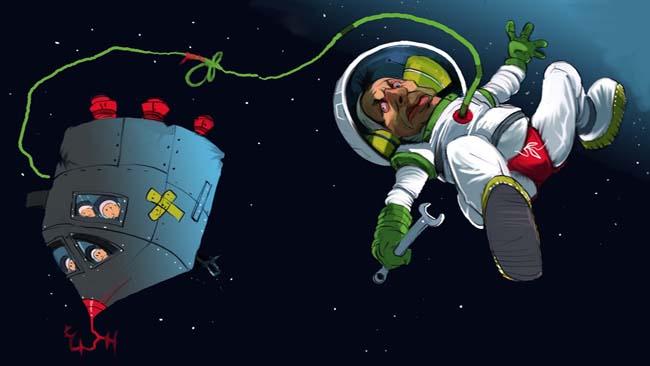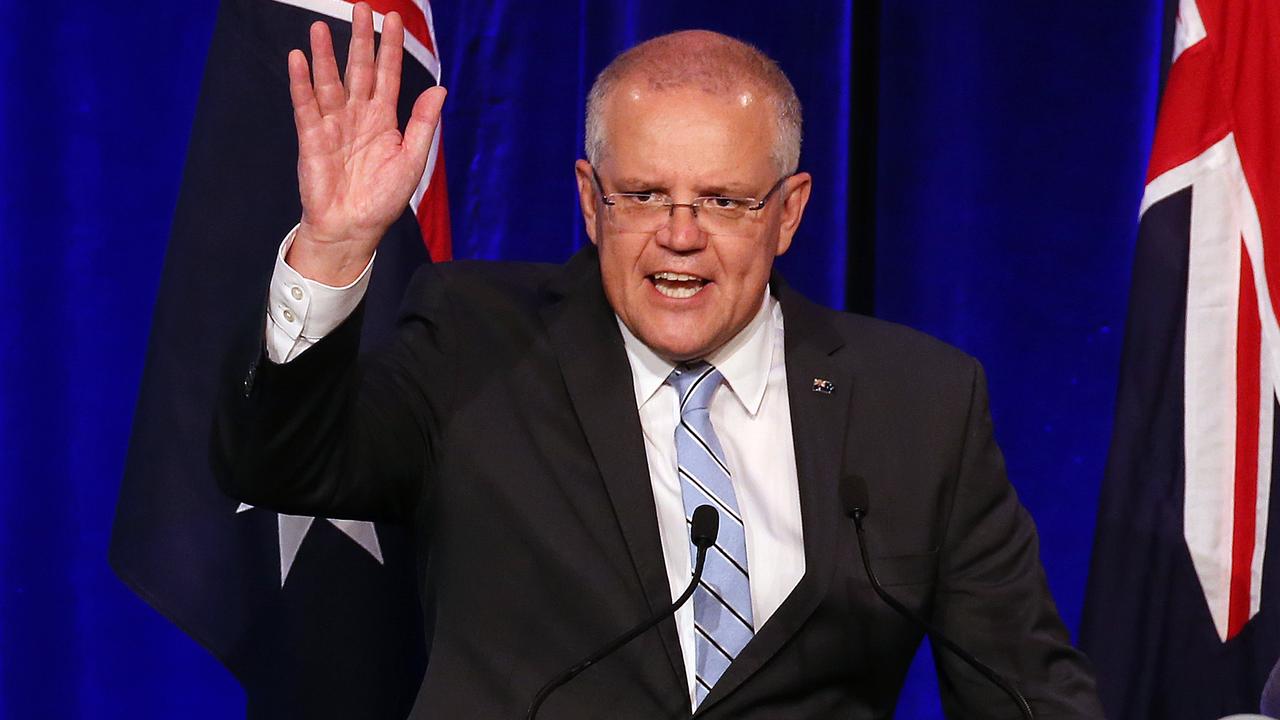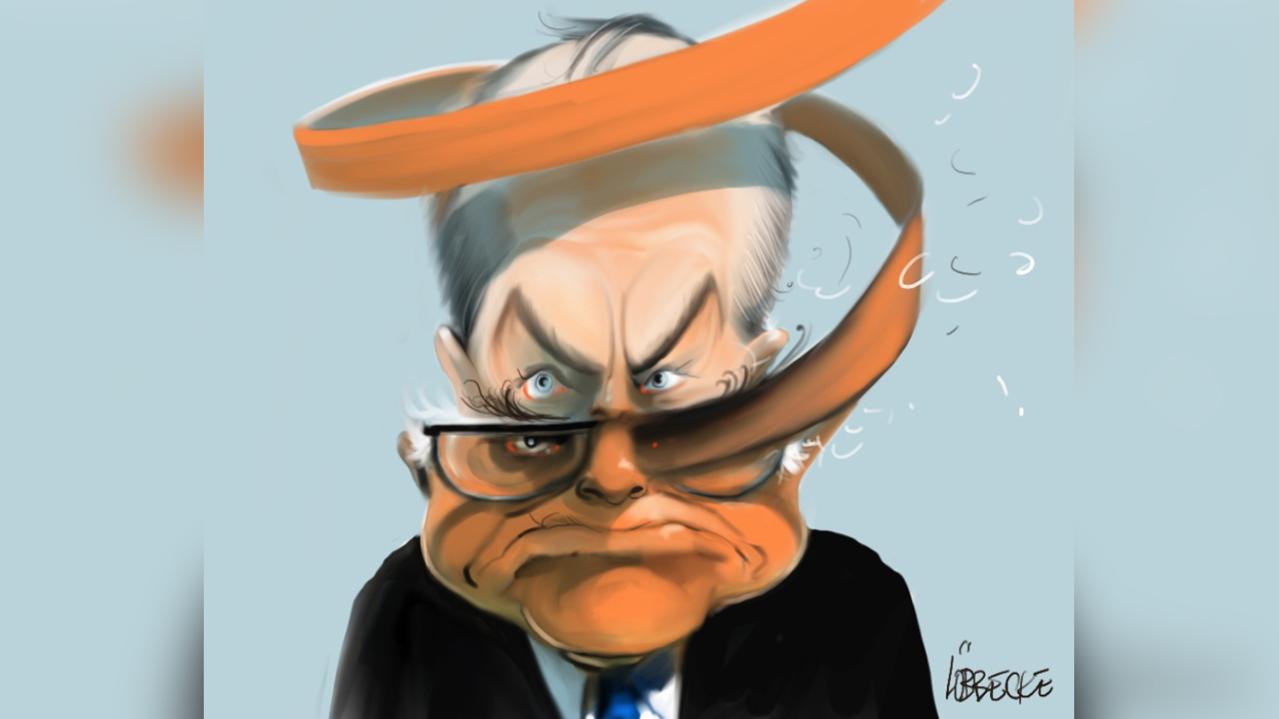Tony Abbott needs new direction to get his mission home

THE observation by Apollo 13 command module pilot Jack Swigert, "Houston, we've had a problem", might now also be applied to the political circumstances of the Coalition.
Apollo 13's mission was to land on the moon, but an explosion in one of its oxygen tanks put an end to that. The priority quickly became getting home safely.
Equally, until recently the Coalition's mission appeared to be winning the next election with the sort of landslide that would give it a strong mandate. Now, I suspect, Tony Abbott and his team will be happy just to get over the electoral line safely.
The latest Newspoll put the Coalition's primary vote at just 43 per cent, below what it was at the 2010 election, whichof course we know wasn't high enough to form government.
The Coalition's primary vote has now fallen to below its 2010 election result in three of the past four Newspolls. The downturn is reflected in the two-party vote: the conservatives were only ahead 51 to 49 per cent on the latest numbers. It was 50-50 two weeks before that. Prior to the last two months, for the previous six months the Coalition's primary vote had consistently sat above the 2010 election benchmark.
And in more bad news for the Coalition this week, Newspoll saw Abbott's personal numbers dip to their lowest point in the three years he has served as Opposition Leader. There is no discounting Abbott's unpopularity.
With up to 12 months to run before the next election is due, the Coalition should be concerned about its capacity to build on its current polling. Without a change of strategy, which seems unlikely, that really does put Labor in a surprisingly competitive position going into the summer break, in stark contrast to the polling nadir Labor faced this time last year.
Despite maladministration across a range of portfolios, a mining tax that didn't raise any revenue in its first quarter of operation, a budget surplus that appears unlikely to be achieved and a Prime Minister under increasing pressure to once again answer questions about her professional past, Labor has improved in the polls.
If the Coalition can't maintain a primary vote above its 2010 election result in the present climate, it says a lot about voter doubts about the opposition. The risk for the Coalition is that if Labor governs well in the next year (a big if), the sound and fury for change will be overshadowed by doubts about the alternative government, especially Abbott as the alternative PM.
And don't think senior Coalition MPs doubt the risks to their electoral chances. The danger for Abbott is that growing doubts about his performance morph into ill-discipline, or worse still, leadership talk. The latter is very unlikely - Abbott won his right to contest another election after his 2010 showing - but the former will happen if the Coalition's party vote doesn't rise.
It's easy to forget that when John Howard called the 2004 election the Coalition was trailing Labor on the two-party vote, according to Newspoll, by 46 per cent to 54 per cent. Pollsters were in the field on the weekend Howard announced the election and that poll released on the Monday also had the Coalition trailing, 48 per cent to 52 per cent. Yet Howard went on to increase the Coalition's majority, such is the power of incumbency.
The next federal election will see the unusual scenario where both major parties need to win seats to win government. Because the Labor Party rules as a minority government, it has no electoral fat it can trim in its bid to retain power. It must go searching for seats it can pick up.
This difficult reality is the reason most commentators, myself included, don't think Labor can win the next election despite its improved polling and doubts about the opposition.
While recent polls show a wobble in the Coalition's primary vote, it should not be forgotten that Labor's primary vote has not once edged above its 2010 election result of 38 per cent in no less than 47 Newspolls.
Voters remain disappointed with the government but also unconvinced by the opposition.
The mood of hope that has begun to pervade some Labor MPs recently is more a reflection of how low they have been (a primary vote in the mid 20s) rather than any great success now.
Nevertheless, if Labor is to build success on the back of doubts over the opposition, it must find seats it can pick up. The government is at its most popular in states such as South Australia and Victoria, but strong performances in both states at the 2010 election make it difficult to find extra seats Labor is capable of winning next time.
Electoral redistributions in Victoria and SA have presented some opportunities for Labor.
The Liberal-held seat of Boothby dipped from a margin of 0.8 per cent to just 0.3 per cent, making it the Coalition's most marginal seat. The twin Liberal seats of Aston and Casey in Victoria saw their margins reduced from 1.8 per cent to 0.7 per cent for Aston (making it the third most marginal), and from 4.2 per cent to 1.9 per cent for Casey.
But the redistribution didn't go all Labor's way. The marginal Labor-held seat of Deakin went from 2.4 per cent to just 0.6 per cent, making it Labor's second most marginal electorate.
Across the country the Coalition has 22 seats with margins of less than 5 per cent, the figure long used by the Australian Electoral Commission to define a marginal electorate. Of the Coalition's 22 marginal seats a disproportionate number are in Queensland (nine) and Western Australia (three), but given debates over the carbon and mining taxes these states favour the conservatives.
Labor has high hopes of winning back seats in Queensland (starting with Brisbane, 1.1 per cent), especially in the wake of the difficulties Campbell Newman's government has had. But small (unpublished) state-based Newspoll results show little support for a recent lift in Labor's primary vote in the sunshine state.
Senior Labor sources claim they are doing better than most people realise in WA, according to their internal polling, putting the Coalition's second most marginal seat of Hasluck (0.6 per cent) on the radar. But again, the small state samples from Newspoll out of WA do not support the claim.
Labor must defend 18 AEC-categorised marginal seats, although that doesn't include electorates on higher margins such as Dobell, held by disgraced former Labor MP Craig Thomson.
Labor's problem is that eight of those seats are located in NSW (nine if you include Thomson's), and both state Newspoll results and internal polling for the two major parties show that NSW Labor has its problems.
The NSW party machine is an awesome campaign unit, as it showed when sandbagging seats at the 2010 election. But even it will struggle to contain Labor's damage in Australia's most populous state, especially given the ongoing ICAC hearings.
All of which adds up to a scenario where the political contest may have tightened, and Abbott appears lost in space, but the degree of difficulty for a Labor re-election remains profound.
History and the polling data tell us that it isn't impossible for the government to pull off an unlikely victory next year, but it remains improbable, notwithstanding voter doubts about the Coalition. After the Gillard government's horrible year, Labor MPs will surely take "improbable" into the summer break as a sign of life well worth fighting for.
Peter van Onselen is a professor at the University of Western Australia.


